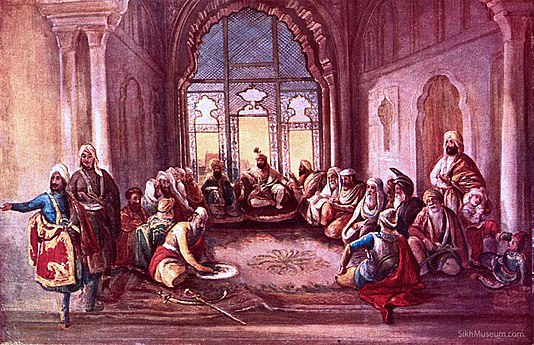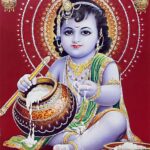Bhoomi Daku De Vaade
This is the account of Guru Nanak Dev Ji’s life. Bhumi Daku, a former dacoit, formerly resided in a village. Guru Nanak Dev Ji required him to make four pledges before he would serve dinner to Guru Nanak Dev Ji at his home.
- He won’t take from the underprivileged.
- Always speaking the truth, he.
- He cannot burglarize that house if he eats there.
- He won’t allow anyone else to be held accountable for his bad conduct.
When Bhumi Daku considered returning to his former ways once more, he was reminded of the pledges he had made to Guru Nanak Dev Ji. While he was able to acquire the immense wealth of the King, his pledges to Guru Ji keep him from committing the crime and serve as a beacon of hope for the rest of the people as well as for him.
Kandhari Vali
Guru Nanak Dev Ji once traveled with Bhai Mardana and arrived in a mountainous area. Guru Ji instructed Bhai Mardana to go to a spring at the peak of the mountain and approach Peer Vali Kandhari, who lived there, for assistance when he began to feel thirsty. Bhai Mardana went there to ask for assistance, but Vali Kandhari turned him down. Then Guru Nanak Dev Ji caused water to materialize in the desolate mountainous region. Angered by what he saw, Vali Kandhari rolled a large boulder in their direction, but Guru Ji intercepted it with his bare hand. Later, the Gurudwara Panja Sahib was constructed here. Vali Kandhari observed this and understood the omnipotence of Guru Nanak Dev Ji and accepted his defeat.
Lalo Te Malik Bhago Bhai
Guru Nanak Dev Ji arrived in Ahmedabad while on the road with Bhai Mardana. Guru Ji observed Bhai Lalo working sincerely and honestly there, and Guru Ji ate the “Kodre Di Roti” at Bhai Lalo’s house. However, even that straightforward dinner was excellent, and Guru Ji noted that it was flavored with honesty and truth. Malik Bhago, a wealthy man who formerly resided in the same city, had planned a lavish feast and summoned Guru Nanak Dev Ji. But when Malik Bhago insisted, Guru Ji went to meet him despite his first refusal to go. When Guru Ji pressed the “Kodre di roti” he was holding in the poor Bhai Lalo’s palm, pure milk began to flow. Similarly to this, when Guru Ji pressed Malik Bhago’s malpuras, it began to leak the blood of the underprivileged.
Sajjan Thug
“Punjabi Sakhis For Kids: Stories In Punjabi” is a podcast you should check out. This is a tale based on Guru Nanak Dev Ji’s life.
Sajjan used to reside in Tolumba, which is now a part of Pakistan. He had created Dharamshala, a location where people might stay, therefore he was regarded as a nice man in his community. However, he had a nasty habit of taking someone else’s possessions as his own and keeping them. Over time, this behavior deteriorated, and he began to rob any guest who occurred to stop by. And eventually, he began to go by the name Sajjan Thug. When Guru Nanak Ji and Bhai Mardana once stayed at their home, Sajjan Thug underwent a full metamorphosis as a result of listening to Guru Ji’s nighttime recitals. He began leading a moral life and giving to others after giving all the fortune he had amassed via wickedness to the needy.
Hello, Tera
When Guru Nanak Dev Ji was young, he was able to secure employment with Nawab Daulat Khan Lodhi in Sultanpur thanks to the recommendation of his sister’s spouse. He had to weigh the food from the godown before selling it to the customers. However, as Guru Ji reached Number 13 (Tera), he would entirely bend on the name of the god and offer the customer more than they had requested while saying “Tera Hi Tera,” which means “Everything belongs to you.”Nawab Daulat Khan, however, went to the godown to investigate when he learned of this. Everyone was shocked to discover that everything was in order and that all the wheat and money had been properly accounted for.
Sauda Sacha
Mehta Kalu Ji, the father of Guru Nanak Dev Ji, was dismayed to learn that his son was not interested in farming or otherworldly activity when he was eighteen. Perhaps engaging Guruji in trading would not only be a good and lucrative job, but it would also make him happy, he reasoned. In exchange for twenty rupees, Father Kalu Ji instructed Guru Ji to “get some real things which can make us a profit when sold.”
To make some purchases, Guru Nanak Dev ji and Bhai Mardana ji set out from Talwandi for Choohar-khana. When they arrived at a community where the saints and other residents were sick, starving, and thirsty due to a scarcity of water and an outbreak of disease. According to Guru Nanak Sahib Ji, nothing can be truly more advantageous than to provide for the hungry and the homeless while also using all of the money to feed and clothe the saints and other people. After returning to Talwandi, Bhai Mardana Ji went to the village and told Mehta Kalu Ji the entire tale. Mehta Kalu was furious because they had lost money while providing food, clothing, and care for those in need. Guru Nanak Dev begged his father not to be upset with him and made an effort to persuade him that there was nothing wrong with the money and that instead, he had made a “Sacha Sauda” (True bargain) in the truest sense. Gurdwara Sacha Sauda Sahib is located where the actual bargain was struck. Gurdwara Sacha Sauda is currently located in Pakistan’s Farooqabad city.
Bhai Mana
A diligent and hardworking Sikh of Guru Angad named Bhai Mana (Guru Angad Dev Ji) Mana worked in the langar of the Guru’s kitchen. However, as a result of Mana’s diligence, he grew arrogant and believed there were no other diligent sewaks in the Guru’s Darbar. Despite doing his job successfully, Mana had a harsh disposition and didn’t hold back while insulting other Sikhs. Sikhs expressed their displeasure with Mana’s actions toward Guru Angad. Mana was spoken to by Guru Angad, who urged him to behave better and to respect all Sikhs equally. Mana got even more rash after hearing the Guru say such things, cursing and abusing the Sikhs who had complained about him. Guru Angad was informed by the Sikhs that Mana’s behavior was deteriorating. This time, the Guru held a meeting and asked Mana to appear. Why hadn’t Mana been serving everyone as directed, Guru Angad questioned. Mana declared that he is the Sikh of the Guru and that he is the servant of the Guru alone. Following this, Guru Angad decided to put Mana to the test and ordered him to leave the Langar’s responsibilities, get some firewood, travel to the jungle, and commit himself there.
As a result, Mana gathered wood, traveled to the forest, and built a pyre. But after starting the fire and spotting the flames, Mana became frightened and did not enjoy the thought of dying. A thief entered the scene in the meantime and inquired as to why the big fire was ignited. Mana told his entire tale. The criminal started to repent after learning about Guru Angad’s fame and believed that, at long last, he had a chance to atone for the misdeeds of his previous life. In exchange for Mana receiving the jewel casket, he sat on the pyre. The thief, who survived the fire unscathed, later converted to Sikhism and joined the Sangat at Khadoor Sahib. Mana, who had gone to the bazaar to sell the diamonds, was detained after a trial on suspicion of stealing them and was later hung.
Badshah Akbar and Guru Amar Das
A well-known Indian ruler was Akbar. He respected the Sikh Gurus for their honest and fair teachings since they were kind and benevolent rulers. Akbar visited Punjab in the year 1569 intending to visit Guruji. He informed Guru Amar Das Ji of his impending visit by sending a telegram. The news made the Sikhs very delighted. Some Sikhs believed that particular preparations needed to be done to welcome the king. Guruji countered, saying, “Akbar is just as much a human person as everyone else. Everyone is welcome in the Guru’s home. Akbar will be greeted at the Guru’s home just like any other guest, so extra preparations are not necessary. The army and the king landed in Goindwal, the home of Guruji. They were warmly greeted by Guruji and a few Sikhs, who then showed him around. Akbar was aware that Guruji had issued the directive that “everyone going to his residence shall take their food in the Langar.” King Akbar was curious about the management of the Guru’s Langar. Everyone received simple food at the Guru’s Langar. Anyone could eat Langar there by sitting in rows (Pangat) as equals, regardless of caste or religion, and it was open day and night. Here, the Hindus and Muslims, the rich and the poor, and the king and his subjects, are all on an equal footing.
Akbar stated after their discussion with Guruji, “I wish to offer a grant of land for operating the Langar. Would you please?
Dear Akbar, I’m sorry I can’t accept your offer to provide the Langar land because the Guru wishes everyone to work hard to earn (Kirt Karni) and to share their sincere profits (Wand Chakna) with others, by contributing something to the Langar from their sincere earnings to help others. Guruji responded. As a result, the Guru’s langar is the Sangat’s (the people’s) langar and must be supported by voluntary contributions from the Sangat, not by royal grants. Because of this, everyone participates in the Guru’s Langar equally and no one is singled out. Each participant in the Guru’s Langar offers as much as they can and only takes what they need. There is no distinction between kings and beggars in this situation. We all enjoy simple meals together, prepared with love. Akbar was a big fan of the Guru’s suggestion. Akbar gave the land to Bibi Bhani, the daughter of Guru Amar Das since he was determined to do something for the house of Nanak. Baba Budhaji was in charge of maintaining the property, and any money made was put to good use.








